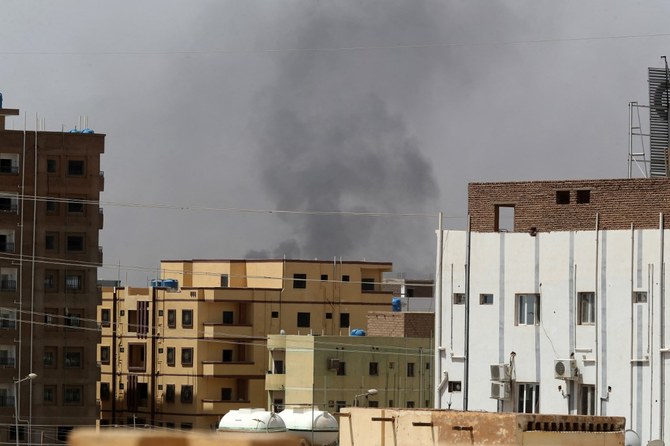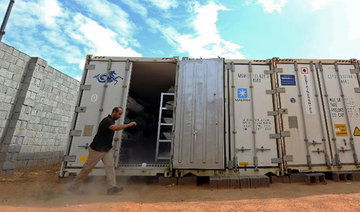KHARTOUM: Sudan’s army appeared to gain the upper hand on Sunday in a bloody power struggle with rival paramilitary forces after blasting its bases with air strikes, witnesses said, and at least 59 civilians were killed including three UN workers.
The fighting erupted on Saturday between army units loyal to General Abdel Fattah Al-Burhan, head of Sudan’s transitional governing Sovereign Council, and the paramilitary Rapid Support Forces (RSF), led by General Mohamed Hamdan Dagalo, known as Hemedti, who is deputy head of the council.
It was the first such outbreak since both joined forces to oust veteran Islamist autocrat Omar Hassan Al-Bashir in 2019 and was sparked by a disagreement over the integration of the RSF into the military as part of a transition toward civilian rule.
The US, China, Russia, Egypt, Saudi Arabia, the UN Security Council, European Union and African Union have appealed for an quick end to the hostilities that threaten to worsen instability in an already volatile wider region.
Efforts by neighbors and regional bodies to end the violence intensified on Sunday. That included an offer by Egypt and South Sudan to mediate between the fighting parties, according to a statement by the Egyptian presidency.
The two rivals have been competing for power as political factions negotiate forming a transitional government after a 2021 military coup. Hemedti’s whereabouts were unknown on Sunday but Burhan was inside army headquarters in downtown Khartoum.
Witnesses and residents told Reuters that the army had carried out air strikes on RSF barracks and bases, including in Omdurman across the Nile river from the capital Khartoum, and managed to destroy most of their facilities.
They said the army had also wrested back control over much of Khartoum’s presidential palace from the RSF after both sides claimed to control it and other key installations in Khartoum, where heavy artillery and gunbattles raged into Sunday.
RSF members remained inside Khartoum international airport besieged by the army but it was holding back from striking them to avoid wreaking major damage, witnesses said.
“The hour of victory is near,” the army said in a statement on Sunday. “We pray for mercy for the innocent lives taken by this reckless adventure taken by the rebel Rapid Support militia ... We will have good news for our patient and proud people soon, God willing.”
But a major problem, witnesses and residents said, was posed by thousands of heavily armed RSF members deployed inside neighborhoods of the capital Khartoum and other cities, with no authority able to control them.
“We’re scared, we haven’t slept for 24 hours because of the noise and the house shaking. We’re worried about running out of water and food, and medicine for my diabetic father,” Huda, a young resident in southern Khartoum told Reuters.
“There’s so much false information and everyone is lying. We don’t know when this will end, how it will end,” she added.
Tagreed Abdin, an architect in Khartoum, said the power was out and people were trying to conserve phone batteries. “We can hear air strikes, shelling, and gunfire,” she said.
Doctors unions said it was difficult for medics and the sick to get to and from hospitals and called on the army and RSF to provide safe passage. Later on Sunday, the army approved a UN proposal to open safe passage for urgent humanitarian cases for three hours every day starting from 1600 local time (1400 GMT).
Sudan’s MTN telecommunications company blocked Internet services on the orders of the government telecommunications regulator, two company officials told Reuters on Sunday.
In Khartoum, several groups of people reported being stranded near the presidential palace and military headquarters.
Social media videos showed military jets flying low over the city, at least one appearing to fire a missile.
The Central Committee of Sudanese Doctors reported at least 56 civilians had been killed and 595 people including combatants had been wounded since the fighting erupted.
Scores of military personnel were killed, the doctors’ committee said, without giving a specific number due to a lack of first-hand information from hospitals.
Egypt called on the fighting parties to ensure the safety of all Egyptian interests in Sudan, the Egyptian representative in the Arab League told a meeting called on Sunday to discuss developments in Sudan, which is also a member of the League.
In a speech at the League, Sudan said the Sudanese should be allowed to reach a settlement internally, without interference from the international community.
The African Union’s Peace and Security Council also called an emergency session on Sunday to discuss political and security developments in Sudan.
The RSF claimed on Saturday to have seized the presidential palace, army chief’s residence, state television station and airports in Khartoum, the northern city of Merowe, El Fasher and West Darfur state. The army rejected those assertions.
The armed forces said it would not negotiate with the RSF unless the force dissolved. The army told soldiers seconded to the RSF to report to nearby army units, which could deplete RSF ranks if they obey.
RSF leader Hemedti, deputy head of state, called military chief Burhan a “criminal” and a “liar.”



























